Five Men Who Forever Changed My Life
 Thursday, February 9, 2012 at 12:02AM
Thursday, February 9, 2012 at 12:02AM 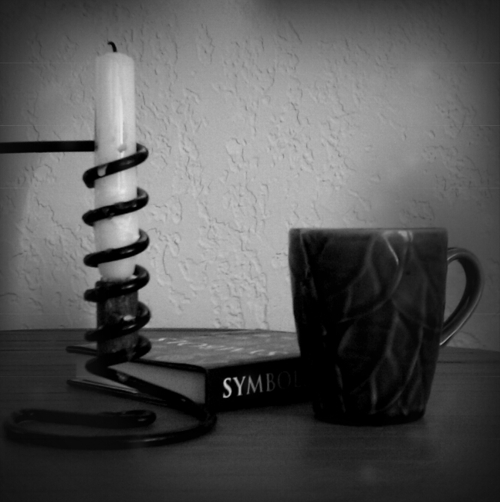 Writing is an exercise in faith. Either that, or vanity. Alone at a keyboard, the voice in my head is my own, and I imagine these pixels will light up some other screen God-knows-where. Writing requires an inflated sense of self-worth. The only act more vain is to write a post all about me. Today I want to share with you the writers who have shaped my life. These five books were not the result of "study." Each was life-changing encounter. Someday, at the marriage supper of the Lamb, I will ask for the privilege of pouring wine at the table of these men.
Writing is an exercise in faith. Either that, or vanity. Alone at a keyboard, the voice in my head is my own, and I imagine these pixels will light up some other screen God-knows-where. Writing requires an inflated sense of self-worth. The only act more vain is to write a post all about me. Today I want to share with you the writers who have shaped my life. These five books were not the result of "study." Each was life-changing encounter. Someday, at the marriage supper of the Lamb, I will ask for the privilege of pouring wine at the table of these men.
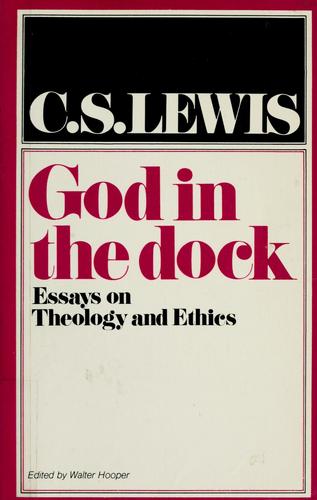
God in the Dock, C.S. Lewis—I had been a high-school evangelical for three years when someone handed me this collection of essays. They changed my life, and Lewis became my first teacher. If you have never read C.S. Lewis, you have missed one of God’s great gifts to the church in the last hundred years. God in the Dock is the most formative work in my life because it was the first to capture my heart and my mind. Thirty-plus years later, Lewis is my constant companion.
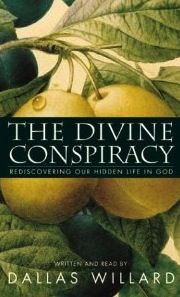 The Divine Conspiracy, Dallas Willard—This book put into words the things I knew, but didn’t know that I knew. Willard is a Southern Baptist with a PhD in Philosophy who teaches at USC: that’s enough to stretch anyone’s idea of what it means to be a Christian. He cracks open our narrow ideas of “the gospel” and re-introduces Evangelicals to “the gospel of the Kingdom of God.” The Kingdom of God was the message of John the Baptist, Jesus, and the Apostle Paul. It should be the message of every student of Jesus but I daresay not one out of ten would define the gospel that way.
The Divine Conspiracy, Dallas Willard—This book put into words the things I knew, but didn’t know that I knew. Willard is a Southern Baptist with a PhD in Philosophy who teaches at USC: that’s enough to stretch anyone’s idea of what it means to be a Christian. He cracks open our narrow ideas of “the gospel” and re-introduces Evangelicals to “the gospel of the Kingdom of God.” The Kingdom of God was the message of John the Baptist, Jesus, and the Apostle Paul. It should be the message of every student of Jesus but I daresay not one out of ten would define the gospel that way.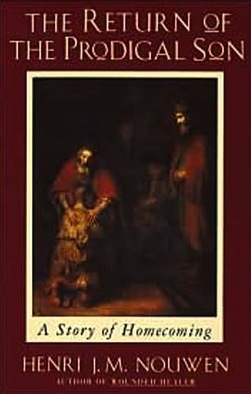
The Return of the Prodigal Son, Henri Nouwen—This book taught me what it meant to reflect upon the scripture. Nouwen is an exegete of the soul. Return of the Prodigal was not the first of his books I read, but it moved me more than any other. It taught me by example how to meditate on the scriptures, and how to place myself into the Biblical narrative. When anyone asks me what it means to go deep in the scripture, I give them this book. Let me know if you want a copy.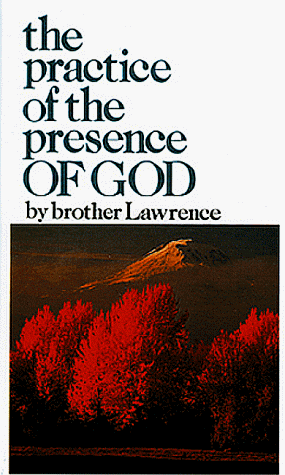
The Practice of the Presence of God, Brother Lawrence—This little collection of letters and thoughts from a centuries-gone Carmelite brother is disarmingly--and dangerously--simple. Far from retreating from the world, Brother Lawrence opens the possibility of being with God every moment. His message is sacramental in the most universal sense. I discovered the secret of not just a daily life with Him, but life that is available moment-by-moment. The Creator of the universe is not far from any one of us: all we need to do is “turn.”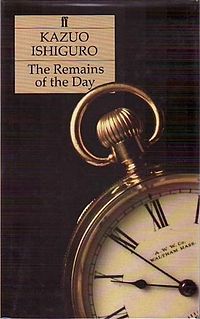
The Remains of the Day, Kazuo Ishiguro—The only work of fiction on this vain list. No amount of explaining will convey the impact this book had on me, but I would be dishonest if I left it off. Perhaps it would mean nothing to you, but it taught me that a life of selfless service is not enough. We are responsible for who and what we serve. This book gloriously wrecked my life. I wept for weeks after reading it, and everything I’ve done since 1994 is a result of it’s impact. You may read it and think, “that’s it?” But if I ever meet Mr. Ishiguro, I will bow before him!
Writing is an act of vanity, but it can also be a gift to generations unseen. I will be forever grateful for the gifts I have received. These writers have made me who I am. More than any others, they formed my life with God. I have had plenty more fellow-travelers. Francis Schaeffer, St. Augustine, Gerard Manley Hopkins, J.R.R. Tolkein, G.K. Chesterton, John Milton, Thomas a Kempis, A.W. Tozer, William Blake, and Ray Bradbury, but in a very real way, these five have changed my life.
May I include one final observation before we part? Years ago I taught a Spiritual Formation class at a nearby university. Our class read Willard’s Renovation of the Heart during the semester. One student, a junior in college, told me that he had never read an entire book, cover-to-cover, before in his life. How could this be? Perhaps it was just this one guy, but I cannot see how one can claim to be a follower of Jesus apart from drinking deep at the well of other believers, and that includes reading books. Not quantity. We should invite the Holy Spirit to be our tutor while we learn at the feet of past masters.
What are your life-changing books? Please let me know. I'll read your comments with great interest.


Reader Comments (9)
Great list! Mine (just spitballin' here): C.S. Lewis, A.W. Tozer, Timothy freakin' Keller, Robert Frost (one of these things is not the others), Spurgeon (when I can figure out what he's saying). Love the site refresh, BTW!
It gets a lot of criticism but for the sheer fact it changed by life so completely by exposing my self-righteousness utterly... "The Spiritual Man" by Watchman Nee. I'm in agreement on "The Divine Conspiracy," by Dallas Willard. Incredible. Richard Foster's "Celebration of Discipline" and "Freedom of Simplicity." Wow! But I'm going to throw a wrench in your title... the last book would be "The Book of Margery Kempe" an autobiography of late 1300's, early 1400's Christian Woman. It could have almost been my grandmother writing the book. And Gran was the one who helped me grow the most in Christ.
Greetings, Aaron and Mandy:
The best thing about trading lists like this is that we are sharing our lives and our journeys, not just our thoughts. I love that you include a poet, Aaron. They are prophets in their own right. And Mandy, the inclusion of voices from centuries past is what we need most these days. Chesterton used to say that "tradition is the democracy of the dead." They should still have a voice in our affairs, don't you think?
I feel as if time and experience (and reading yet to come) have yet to really answer this question for me. But I can clearly identify texts that have redirected the course I have taken thus far:
N. T. Wright - I have you to thank for this one, Ray, as you were the first one to draw my attention to his name. Following Jesus, a footnote in Wright's bibliography, really, was a huge breakthrough during a very strange time for me, when I had only recently stumbled back into the Christian faith. It blew my perceptions apart and led me to the rest of Wright's work. If that was the beginning, Jesus and the Victory of God was where Wright made the biggest impact on me, reshaping the way that I approached the New Testament entirely.
C. S. Lewis - This one isn't what you're thinking. I greatly admire The Great Divorce and The Problem of Pain, but my first impressions of Lewis were from reading Mere Christianity and The Lion, The Witch, and the Wardrobe in middle school - and strongly disliking them. That might seem like an odd reason to put Lewis here, but in an odd way, my sense of discomfort with those texts shaped my journey to define myself apart from my childhood faith.
Plato and Marcus Aurelius - OK, these ones probably seem downright strange right off the bat, so a story is required. From 3rd grade through high school I attended a church-school, and one of our favorite ways to evade work and supervisors was to sneak into the back computer room. In this room was a shelf filled with books long coated in dust, and among them was a four-volume set of philosophy, and for some reason one day in middle school I picked up the volume labeled "Ethics," which contained Plato's The Republic and Marcus Aurelius' Meditations. I found the content oddly riveting and came back repeatedly for more. For the first time since learning the basic ABC's of Christianity (the end of learning in most lay evangelical contexts) I felt utterly captivated by the big questions: What is the nature of this strange universe that we find ourselves in? What does it mean to be alive? To be human? What do human relationships and societies mean? Who are we, and how should we live? What is this thing that we call "the divine," and what does it mean? For the first time I realized that I wanted to bury myself in these questions in whatever way possible. Though I have not yet read these texts in their entirety and probably could never recall their contents with any precision, I think that in a strange way they ended up defining who I am before everything else.
On the strength of your recommendation I will get "Remains of the Day."
- The works of Hugh Ross, in some way, both planted the seeds for my crisis of faith (i.e. the big one; I was in agony) -- and also for recovery.
- In like fashion, Mark Noll - "The Scandal of the Evangelical Mind" planted seeds for trouble. But "Jesus Christ and the Life of the Mind" was like a spiritual catapault or trebuchet. But that being said, having a Christocentric vs. a biblicentric view can make you unwelcome at some tables. It helped me through.
- The Life of St. Anthony. Not so much for insight -- it is hard to read for that, but has some -- but in the plank-across-the-face realization -- priorly just a kind of dim acknowledgement -- of how very different Christianity is experienced in diverse times and places; that much of what is "normal" to us is a matter of cultural accretions and scat.
Jessie: When you have to tell a story in order to explain why a book is life-changing, that's a good book! I have a new image of third-grade Jessie sneaking away to find forbidden fruit. Plus, you get bonus points for this fine phrase, "For the first time since learning the basic ABC's of Christianity (the end of learning in most lay evangelical contexts)"
Charles: I hope you like Remains of the Day. Ishiguro won the Booker prize for his efforts, but it's not for everyone. I hope it's for you! Also, books (or authors) who tear down and then build up are among my favorites. It's like Jeremiah (the prophet, not the bullfrog).
Hi Ray, Great list. I have Remains of the Day on the shelf but have never read it...will have to do so...
Here's my list (which may change next week):
- The Lord of the Rings by J.R.R. Tolkien
- God and the World by Pope Benedict XVI (Salt of the Earth should be mentioned)
- Orthodoxy by G.K. Chesterton
- Confessions by St. Augustine
- The Splendor of Truth by Pope John Paul II
By the way, do you have a goodreads account?
Peace and good!
Jason: I'm glad you already have "Remains of the Day." At least you won't be out the the price of the book if you don't like it.
Josh: Sorry, no ~ I don't have a goodreads account. Do I need one. I also understand your comment that the list will change next week--you are young, it should change. Eventually, some books will take their place as life-changers and hold their position all your life.